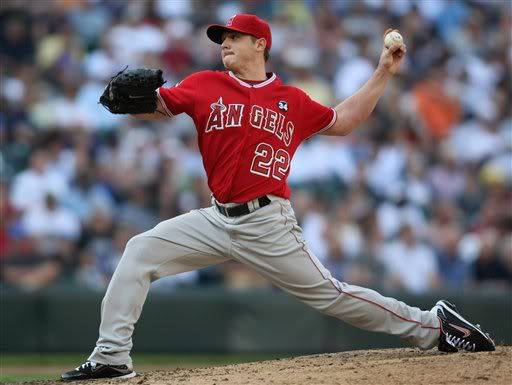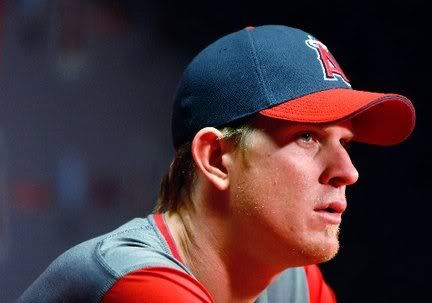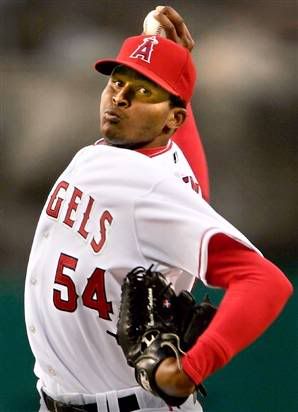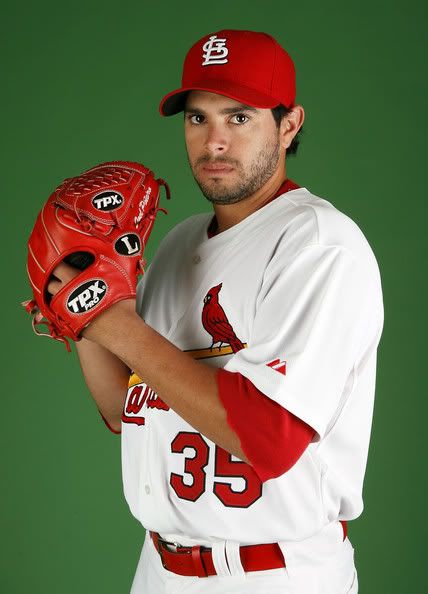The Angels need an ace pitcher. I know it, you know it, the American people know it. Having already scraped the bottom of the free agent and trade barrel in search of said ace, the Halos now have no other choice but to look inwards. But who is really up for the task? All five Angel starters certainly have a claim to the job, but can any of them overcome their fatal flaws and take their game to the next level?:
Scott Kazmir
Pros:
- He’s been an ace before, granted it was for the Rays back when they were so bad that they had to change their name just to avoid the stink of how bad they were, but from 2006 through 2008 he was a bona fide front of the rotation starter, winning games and dominating opposing batter.
- Because he better be an ace, after all, that is why the Angels acquired him. Part of being an ace is coping with expectations and right now Kaz has the pressure of becoming a staff leader squarely on his shoulders. Pressure has a funny way of bringing out the worst or the best in people and I have a feeling (well, really it is just a hope) that Kaz is more the latter type of guy.
- Mike Butcher is Kazmir’s personal messiah. Kazmir’s best season in Tampa Bay came when Mike Butcher was the pitching coach there. It was Butch that helped him find his command and harness his potential. Once Butcher gets his hooks into him again, he and Kazmir can finish what they started in Tampa and transform Scott into an unquestioned elite starting pitcher.
Cons:
- Aces need to eat innings and that isn’t exactly Kazmir’s strong point. Only once in his five full seasons has he topped the magical 200-inning mark and that isn’t going to get it done. Aces need to be durable and go deep into ballgames to spare the bullpen.
- Kazmir already failed his first audition at being the top dog in the rotation when he flubbed all three of his post-season appearances. If he can’t get it done in the post-season, then he definitely isn’t an ace.
- Nibble, nibble, nibble, nibble. Maybe it was just how Kazmir dealt with his comeback from injury, but his first tour of duty with the Angels showed him to be a power pitcher who had a bad habit of trying to get cute for the sake of racking up strikeouts rather than pitching aggressively and forcing opposing batters to prove they can hit his often electric stuff.
Jered Weaver
Pros:
- Weaver is coming off a career year and just entering into his prime at age 27. The talent has always been there for Weaver, but last year was the closest he ever got to putting his physical tools together with the mental side of his game and the results were pretty impressive. If he can build on his success from last year, the sky is the limit.
- From a mental standpoint, Weaver is probably the toughest of the Angel starters. He is the only guy who shows any fire on the mound and he seemingly lives for the big moments. Having that kind of passion and confidence is crucial for an ace as they will allow him to still give the team a chance at winning even when he doesn’t have his best stuff.
- Durability goes a long way for aces. Weaver only just pitched 200+ innings for the first time, but he also is the only pitcher on the staff who doesn’t have a history of health issues, so he is the de facto workhorse.
Cons:
- Weaver has good stuff, but he doesn’t have ace stuff. His fastball isn’t overpowering. His breaking pitches don’t buckle knees. What really makes Weaver successful is deception and guile, but against the best hitters in the game in the biggest moments, those two characteristics only get you so far.
- Flyballs = home runs and Weaver gives up fly balls at a wild rate. Amazingly, he has never really given up too many dingers in a given season, but logic simply demands that it happen. If Weaver is a constant threat to allow a back-breaking homer, I don’t see how he can be trusted in big moments.
- Even with his hair chopped off (finally), Weaver is just kind of goofy looking. With the exception of Pedro Martinez and his jheri curl, aces typically have a presence about them. A presence exudes confidence and determination. When you look at Weaver, the only sense you get about him is that he showed up for the game just after riding a tasty wave and ripping a bong load.
Ervin Santana
Pros:
- Well, it is an even year, so Santana should actually be good this year. As we saw in 2008, when Ervin is good, he is REALLY good.
- Based on pure stuff alone, Santana should be the ace of the staff. He has a hard and live fastball and his slider is vicious when his mechanics are sorted out. If his mental game ever catches up to his physical abilities, the league should be very scared.
- His strong finish to the 2009 season strongly indicates that his early issue were health related
Cons:
- Ervin is so mentally fragile, he makes Rip Torn seem like a model of stability. Let’s not forget about the year that Santana inexplicably couldn’t handle pitching on the road. That hardly speaks to him having the mindset of frontline starter.
- I feel like all the arguments in the Pros section for Santana could have been applied to Ramon Ortiz as well. I just made myself sad.
- Weaver gets crap for giving up too many flyballs, but somehow Ervin skates even though his flyball rates are just a tick below Jered’s. Knowing how much of a propensity Santana has for giving up big innings, his extreme flyball tendencies are the equivalent of throwing gasoline on a fire.
Joe Saunders
Pros:
- He just wins, baby. Saundo has won 17 and 16 games, respectively, in his first two full seasons in the league. He was downright lousy most of last year and still managed to win 16 games. At the end of the day, an ace is judged by his ability to win games and Saunders is well out in front of the rest of the pack in that measure.
- Saunders flashed ace potential in his first ALCS start when he locked up the Yankees for seven solid innings. He didn’t win the game, but it wasn’t his fault. But any guy who can pitch that well on such a big stage in such a big moment certainly has ace potential.
- It may have been to the detriment of his team in the end, but Saunders showed some huge stones last year when he tried to suck it up through months of arm pain so as not to put an already injury-ravaged rotation even further behind the eight ball. That kind of willingness to sacrifice for the team is certainly admirable and shows an element of mental toughness key to an ace’s resume.
Cons:
- Aces are supposed to be overpowering and Saunders certainly isn’t that. Saunders can barely even crack the 100-strikeout mark on a season and any pitcher that can’t miss bats on a regular basis isn’t going to survive long at the front of the rotation.
- There just isn’t anything that Saunders does particularly well. I don’t mean to suggest he is bad, but rather that he just doesn’t have any one trait he can rely on when the going gets tough. His stuff, command and make-up are all average to above average at best.
- If Saunders becomes an ace, he will be the first to ever do so that has a case of chronic “dead arm.” Two years in a row now, Saunders has developed some sort of nagging pain in his pitching arm that sent him into a downward spiral for several weeks. Call me crazy, but I don’t remember Roger Clemens going into an annual funk to deal with dead arm. Hmm, maybe that was a bad example, but you get my point.
Joel Pineiro
Pros:
- Dave Duncan has created many an ace in his day and Pineiro might just be the latest. He isn’t a traditional looking type of ace, but he sure got the job done last season with a 3.49 ERA and 1.15 WHIP. If he has the Duncan stamp of approval, that might be good enough for the gig.
- The element of surprise is on Pineiro’s side. He has been in the American League before, but no team has really seen his new sinker yet. It could take a while for batters to adjust, I just don’t know if it will take long enough for Pineiro to really establish himself as an ace for more than a season.
- Grounders aren’t sexy, but they do prevent homers and big innings. No big innings means the team always having a chance to win the game and aces are ultimately judged by their win totals. If Pineiro can continue inducing grounders at the prolific rate he did in 2009, he might just end up being the most unassuming ace of all time.
Cons:
- Pineiro is a mystery wrapped in a riddle wrapped in an enigma. Nobody knows if his stellar 2009 was just a fluke or the real deal. Whatever the case, that kind of uncertainty doesn’t lend itself very well to leading a pitching staff.
- What makes Pineiro so good is his ability to induce grounders, but the fear of grounding out doesn’t exactly intimidate opposing batters. Baseball is a mental game and if a batter never really thinks of a pitcher as an ace, can he really be one? I feel like only Confucius can answer that.
- Joel has been injured and/or crappy almost his entire career. At age 31, Pineiro is what he is already. If he was going to be an ace, he would have at least shown some signs before last year.
Add The Sports Daily to your Google News Feed!




